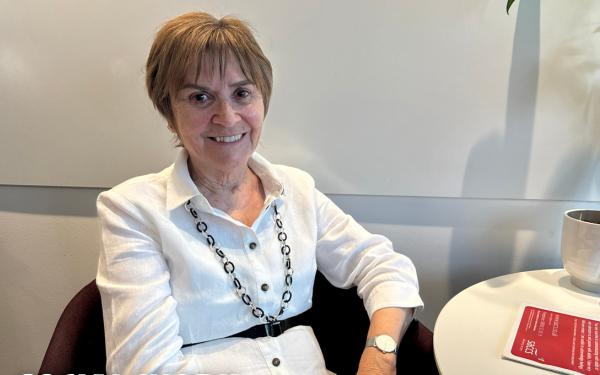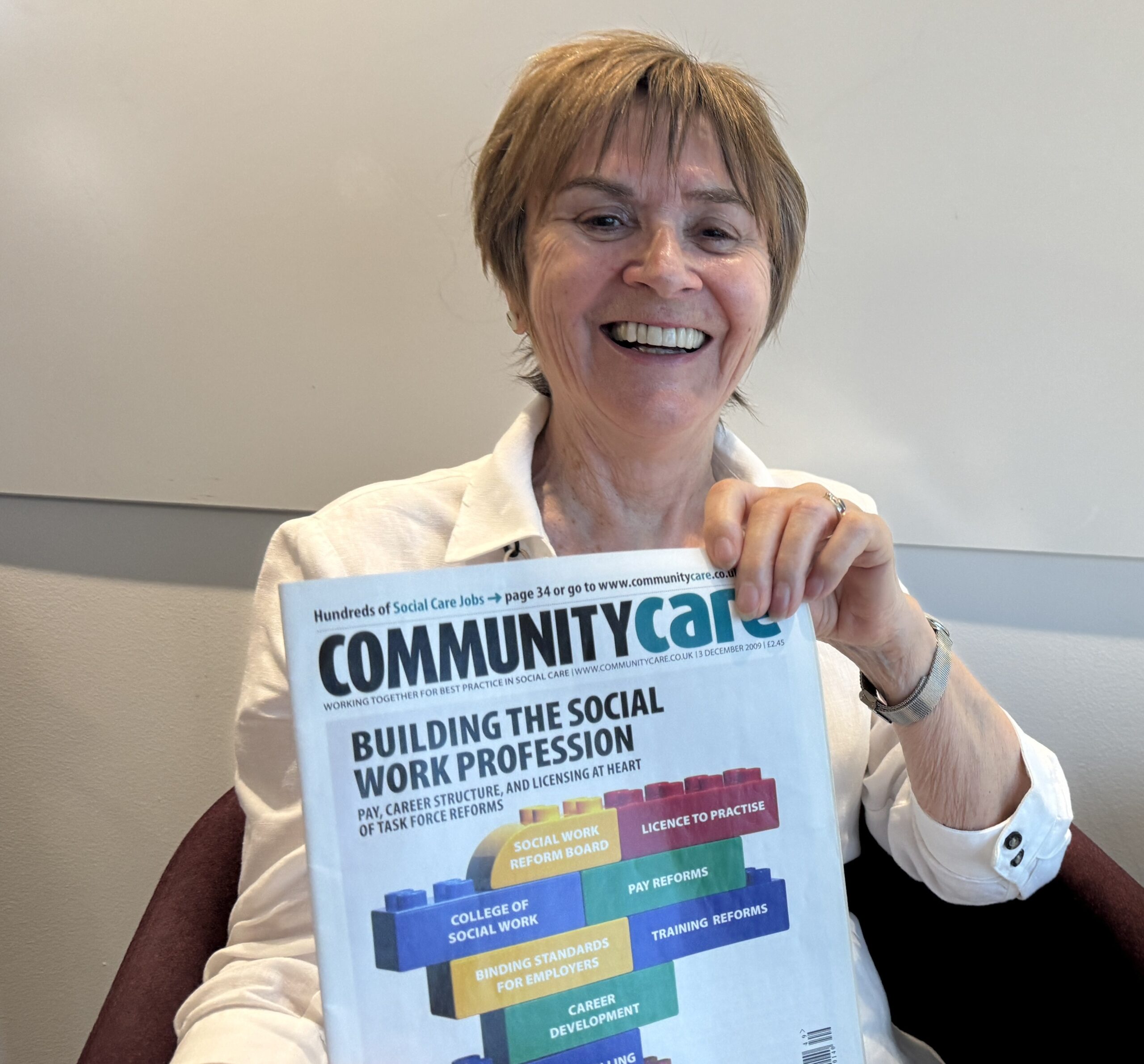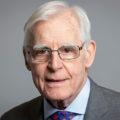
Do you think there is a disconnect between senior management and frontline practitioners?
- Yes (92%, 747 Votes)
- No (8%, 68 Votes)
Total Voters: 815
This article is part of a series of profiles of key figures who have shaped social work over the past five decades, to mark Community Care’s 50th anniversary. Previous interviewees include Brid Featherstone, David Howe, June Thoburn, Eileen Munro and Herbert Laming.
Dame Moira Gibb’s calling to leadership was evident even when she vehemently resisted the step-up to management.
Just three years after qualifying, she walked out alongside her colleagues in Newcastle protesting the pressure to move into management – and ended up a leading figure in the strike.
It was one of the longest organised strikes in social work history. From August 1978 to May 1979, over 2,500 social workers in 15 local authorities walked out over staff turnover, pay, and a push for practitioners to take on managerial roles due to vacancies.
“We thought we were in the right,” says Gibb now.
“We were campaigning about the ability to stay in practice and not have to move into management to gain a higher salary. How do you not have the front line served by your least experienced people?”
Gibb was selected to give a speech on the first rally, her candour and passion quickly ‘catapulting’ her to being a spokesperson for the strike.
“I ended up going around to other councils making speeches about why they should pursue the same approach.”
Still, despite cherishing memories of solidarity and camaraderie from that time, Gibb calls striking “terrible” for social work.
“It felt very bad to be walking away from your clients. Some people contacted them and tried to support them, but it’s a terrible waste of resources and, in social work, we ought to be able to negotiate and understand the perspectives of both sides.”
Listening to frontline staff
At the root of the strike, she says, was a disconnect between management and frontline staff that she has tried to address throughout her career – both as director of social services at Kensington and Chelsea from 1990 to 2003 and later as chair of the 2009 Social Work Task Force.
As a director, she tailored her service based on feedback from frontline staff and those who used social services, helping make Kensington and Chelsea one of the top-rated social services authorities in the country according to inspectors.
Her words are layered thick with pride as she talks of that time.
“They said we were one of two best in the country,” says Gibb.
“And it was simple things, like people not having to give their details three times because they met three different practitioners, approving new services that made sense to young people, and talking to them before making decisions that would affect them. But also listening as an organisation to design the service, instead of relying on the frontline [to do that].”
Senior managers – Gibb included – were also required to spend at least two weeks every year working with cases to stay connected to the profession and their staff.
“How do we know what is needed if there is no touch with the frontline and the clients?”
Even today, when looking at the future of social work, the first thing that springs to Gibb’s mind is the relationship between management and their practitioners.
“It is my hope that senior managers understand what the life of a frontline social worker is and what they need to make a difference for families.”
Forming the Social Work Task Force

Pictured: Moira Gibb
Even after becoming distanced from social work, after being appointed chief executive of Camden council in 2003, Gibb remained passionate about frontline practice.
That passion led her to chair the Social Work Task Force in 2009.
In December 2008, in the midst of the media storm that marked the Peter Connelly (Baby P) case, then children’s secretary Ed Balls fired Haringey’s director of children’s services, Sharon Shoesmith, on live television.
The same month, Gibb received a phone call from Balls’ office to form the taskforce.
It was to be a group of 18 experts who would review frontline practice in England and help improve recruitment, training and the overall quality and status of social work.
“My theory was [Balls] thought he’d gone too far in his response with Sharon and wanted to demonstrate that he was a friend of social work,” says Gibb.
‘We wanted to reinforce a sense of professional identity’
When they went around England talking to social workers, what they found, says Gibb, was struggling departments over-relying on frontline practitioners to resolve their running issues.
“They were not understanding the consequences of what they were asking practitioners to do,” she says. “Practitioners thought what they were doing was social work, but they were also doing bits of welfare, bits of what the department needed from them – we needed to reinforce a sense of professional task and identity. There seemed to be no space for relationships.
“We wanted practitioners to feel they could say, ‘You can’t ask me to do that because it would be against my professional standards’.”
Their final report, published in November 2009, found that people supported by social workers were “not getting the consistently high quality of service they deserve” because of weaknesses in recruitment, retention, resourcing, training and leadership.
It also identified a dangerously poor public understanding of the profession.
The taskforce presented 15 recommendations, some of which remain in place today, including: increased entry standards for social work degrees, the assessed and supported year in employment (ASYE) to improve early career support, and the standards for employers of social workers in England, to enhance organisations’ support for their staff.
Unfortunately, similarly to Eileen Munro and Lord Laming’s reviews on child protection in the same period, the taskforce’s recommendations came at a time of change for England. Within a year, a new government came into office and implemented a programme of public sector austerity.
‘Our last recommendation was to have a reform board to coordinate the changes so they didn’t have to be done all at once. Then the Coalition came. They supported the work for a year, but then took away the funding and closed down the board,” says Gibb.
“I still think, if implemented in full, the recommendations would have made a big difference.”
Munro echoed this sentiment in an interview on her 2010-11 review earlier this year.
The College of Social Work
Gibb calls the Baby P case one of social work’s ‘low points’ – a time when practitioners were hounded by the media with no voice to defend themselves.
The taskforce’s solution was the College of Social Work, a professional body that would be a strong, social work-led voice in public debate and policy development, and raise standards for the profession.
“We looked at what other professions did and thought social workers needed something to give them a sense of identity that wasn’t defined by their employer. That’s what makes a profession, we thought,” says Gibb.
“Managers are very important and can make a big difference, but they shouldn’t be able to call all the shots about what’s quality social work. The standards for lawyers aren’t set by the government. They have input themselves into what is appropriate.”
Share your story
 Picture: daliu/fotolia
Picture: daliu/fotolia
Would you like to write about a day in your life as a social worker? Do you have any stories, reflections or experiences from working in social work that you’d like to share or write about?
If so, email our community journalist, Anastasia Koutsounia, at anastasia.koutsounia@markallengroup.com
The College was established in 2012, but closed down in 2015 when the government pulled its funding after it failed to become financially independent due to a shortage of fee-paying members.
“It ran out of steam,” says Gibb. “It didn’t have the traction I would have liked it to. But it had a positive impact on the morale of social workers, I would claim that.
“A sense of, yes, somebody is speaking about the profession in positive terms, and not just about the failures.”
‘Telling social work’s story’
Gibb hasn’t worked for or within the sector in a while, but – in her own words – her love for it hasn’t faded.
“I think my passion for the frontline and for social workers to tell their story better are two things that could go on my tombstone,” she jokes.
Her taskforce pushed for improving the public understanding of the profession by fostering relationships between social workers and local media, establishing clear protocols for managing breaking stories involving social work, and maintaining a repository of success stories to showcase good practice.
As part of that, Gibb invited The Sun editor Deidre Sanders to be among the 18 experts comprising the team, which included social work leaders and academics.
Her choice was regarded as polarising following The Sun’s vitriol against the social workers involved in the Baby P case. But she was determined to tell practitioners’ stories to the outlets that were, she says, read by and representing the average citizen.
She describes Sanders as “a great supporter”, one who accepted criticism when it came and defended it when she thought it was right.
Opening social work’s doors to the media
There is a lot to be said – and feared – about social care services opening their doors to the media. Trauma and history lie heavy between the two, even when not accounting for the profession’s innately sensitive and private nature.
But Gibb is a firm believer in the value exposure can bring to the sector.
“We want people to say they want to become social workers so we’ve got talent to recruit from, we want people to seek intervention from social services at the right time, and government to give resources to something that matters to their citizens,” she says.
“But if the citizens never think about it, they’re not going to say that’s a good idea. Media exposure cannot keep being at the bottom of the pile.”
Her decades of experience have taught her that when local and national reporters are invited in, they’re often left impressed with “how different it was from what they thought and from how it is portrayed”.
“We should be braver,” she reaffirms.
She praises Coventry council’s 2023 documentary with Channel 4, Kids, about six young people about to leave care, as a successful example of social care services opening their doors to the cameras.
The feature led to the local authority recruiting six experienced practitioners shortly after the third episode aired.
“Lots of local authorities genuinely say, well, somebody else can do it because we were so small or because this and that,” says Gibb.
“Social workers have to be willing to expose themselves, to feel confident enough in their professional practice to be observed. It could make a world of a difference.”







 Bournemouth, Christchurch and Poole
Bournemouth, Christchurch and Poole  Hampshire County Council
Hampshire County Council  Oxfordshire County Council
Oxfordshire County Council  South Gloucestershire Council
South Gloucestershire Council  Wokingham Borough Council
Wokingham Borough Council  Webinar: building a practice framework with the influence of practitioner voice
Webinar: building a practice framework with the influence of practitioner voice  ‘They don’t have to retell their story’: building long-lasting relationships with children and young people
‘They don’t have to retell their story’: building long-lasting relationships with children and young people  Podcast: returning to social work after becoming a first-time parent
Podcast: returning to social work after becoming a first-time parent  How managers are inspiring social workers to progress in their careers
How managers are inspiring social workers to progress in their careers  Workforce Insights – showcasing a selection of the sector’s top recruiters
Workforce Insights – showcasing a selection of the sector’s top recruiters 

 Facebook
Facebook X
X LinkedIn
LinkedIn Instagram
Instagram
Why are Community Care’s previous interviewees all from the same demographic (White, able-bodied, middle class etc)? This is not reflective of the profession or those we work with.
Hi Suzanne, thank you for your comment, that is a very fair point. The goal of this series was to interview figures that have played a significant role during key moments in social work history – e.g. the Maria Colwell case, Victoria Climbie, Baby P, Domestic abuse research, 2010 sector reviews – and so through research I pinpointed those most qualified for those moments in time. However I acknowledge more can be done to diversify our range of interviewees and I will be taking this on board in the new year. If you would like to read more such interviews, can I signpost you to our recent ones with Beverley Tarka, Meera Spillett, Omaid Badar, Wayne Reid and social work’s ARM group? We’re also always keen to get suggestions for new interviewees, so please do get in touch with any ideas. Thank you, Anastasia
Thanks for your reply Anastasia, but why are none of those people listed as previous interviewees on this or other relevant anniversary webpages?
Hi Suzanne, all profile interviews appear on the home page when published – whether anniversary-related or not – and then can be found through the search bar. However, thank you, we’ll take your feedback on board as we continue to navigate our site.
But it is reflective of the demographic of senior social work leadership. Reporting reality doesn’t mean Community Care is pushing an agenda. Social work profession needs to change itself not journalists what they report.
Who said anything about senior social work leadership Ade? Please don’t twist my comments to suit your agenda.
Bit unfair that I think. Neither CC nor Ade can magic up a more diverse and representative leadership cohort can they? What CC has done though is hive space to practitioners and others colleagues of colour which I certainly have read and indeed commented about. As it happens the “profession” isn’t that representative of the communities in which social workers practice in either. That those recruiting and promoting are still wedded to the idea that being white, able bodied, middle class are in themselves indicative of competence is the real issue here isn’t it? As Ade says Community Care reflects our profession, it’s not the role of journalists to shape it. As for leadership, the interview was with Dame Moira Gibb and as far as I’ve read the Anniversary series is feature on social work milestones which given the cohort that reach those positions isn’t going to reflect diversity. Anastasia has listed other colleagues that CC has featured and I got one find those just as worthy.
I worked under Dame Moira in Kensington and Chelsea and while her descriptions are less rosy than my experience on the whole her leadership was positive. What’s disappointing is that the leadership needed to establish a College of Social work lacked the thrust that could have won the confidence of social workers. The buried detail of why we didn’t get a College isn’t just that funding was short but the active sabotage of it by self interest groups like BASW. I remember the toxicity BASW generated to sink a what would have been a rival. It was dishonest and Dame Moira and others should have had the steel to confront them about it. As for senior managers dipping in for a fortnight to do case work, my recollection of it is that it was disruptive with team managers diverting energy to accommodate them than supporting us to lead them to a more realistic understanding of front line pressures. Good idea no doubt but anxiety to show how well our team was managed minimised it’s usefulness. As for social workers willing to expose themselves to scrutiny, we are the most micro judged public profession already. We are not scared of being observed, what we are scared of is that our managers will abandon us at the first sign of negative reporting rather than robustly defend our practice and show some pride in social work.
the older I get the better I was……
Ridiculous tokenism of senior managers doing case work – stay in your lane and
– challenge ridiculous performance indicators that do nothing for families but mean social workers are on a constant treadmill being criticised for failing timescales
– reduce the ASYE requirements as many of the ones I talk to are overwhelmed and distressed about the amount of work they have to do on it having just spent years doing a degree (BTW many don’t have protected caseloads!!)
– work with the leaders of other agencies and government to promote the value of social workers
– Stop hiring incompetent senior interims that create misery for services and go and fill in those posts for a few weeks if you want to ‘get back to it’ (there are so many incompetent senior managers circulating round the UK creating chaos on £500-£900 a day)
– Sort out work conditions and caseload limits for social workers
-Lobby for an assault on a SW to be included in the Emergency Worker protections
there are loads for senior managers to do without doing a bit of casework ….after all in 2 weeks spread over a year it would only be low level assessments and not any of the heavy end work like court and complex investigations that requires continuity of staff.
I agree with every word Kat says.
It doesn’t help when the chair of SWE is not a qualified Social Worker
I also worked in K&C but rather than comment on my recollections there I would just like to say that I agree with everything Kat has written. Our Leaders would do well to read and reflect on those words.